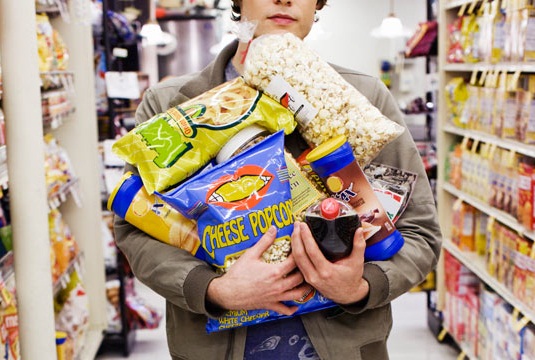
采购食物:习惯优于喜欢
People Pick Familiar Foods Over Favorites
采购食物:习惯优于喜欢
A study found that the stronger a subject's memory of a particular food, the more likely they were to choose it again, even over foods they professed to enjoy more.
一项研究发现,人们对特定食物的印象越深刻,他就越有可能再次选择该食物,即使有其他他们声称更为喜欢的食物。
撰文/播音 伊莱卡·巴拉斯
翻译 M
审校 邰伦玥
In Marcel Proust’s iconic Remembrance of Things Past, a taste of cake elicits a flood of memories.
在马塞尔·普鲁斯特的代表作《追忆似水年华》中,尝一口蛋糕会涌起泉水般的回忆。
Now a study finds that the stronger your memory of a particular food, the more likely you are to choose it again. And it doesn’t matter how objectively unattractive the food may be—which perhaps explains why you may crave those peanut butter and marshmallow sandwiches from your youth or can’t break that fried chicken habit when trying to diet.
一项研究发现,人们对特定食物的印象越深刻,他就越有可能再次选择该食物。这与该食物客观上好不好吃无关——这似乎可以解释为何许多人对儿时吃的花生酱棉花糖三明治念念不忘,在节食的时候无法克服吃炸鸡的习惯。
The food-memory study is in the journal Neuron. [Sebastian Gluth et al, Effective Connectivity between Hippocampus and Ventromedial Prefrontal Cortex Controls Preferential Choices from Memory]
这项关于食物记忆的研究发表在《神经元》。
Researchers asked 30 hungry young people to rate snacks such as potato chips and chocolate. No actual food was presented. The snacks were merely displayed on screens associated with locations. Then the study participants were asked to choose between two locations, as proxies for the snacks. And the hungry subjects went with memory over taste preference—that is, they picked what they were better able to remember even if they had rated them lower in the first part of the test.
研究人员要求30名饥饿的年轻人对薯片、巧克力等零食进行评分。此时,没有任何食物实物摆在他们的面前。这些零食仅仅被展现在屏幕的不同位置上。然后,这些参与者被要求在屏幕的两个位置中进行选择,从而得到该位置所代表的零食。进而,这些受访对象根据他们的记忆、而不是他们的偏好进行选择。即他们会挑选他们那些他们能够记起位置的食物,即使在前一项实验中这些食物获得了更低的评分。
The participants’ brains were scanned during the process of choosing. And the researchers found that the exercise caused increased communication between the hippocampus, associated with memory, and the part of the frontal lobe home to decision-making.
在进行选择时,参与者的大脑会被扫描。研究人员发现,在这项活动中,参与者大脑的海马体与额叶的相互作用有提升。其中海马体是大脑中与记忆相关的部分,而额叶则是与决策相关的器官。
Which may show why when we’re making food decisions, familiarity often wins out over other factors—and why your shopping list looks virtually the same week after week.
这项研究或者揭示了为何当我们选择食物时,熟悉程度往往胜于其他因素,这也解释了为何你每周的采购清单看起来都是一样的。
未经书面许可任何人不得复制或镜像
京ICP备11000850号-1
 京公网安备11010502039775号
京公网安备11010502039775号 信息网络传播视听节目许可证0111611号
国家科技基础条件平台

















